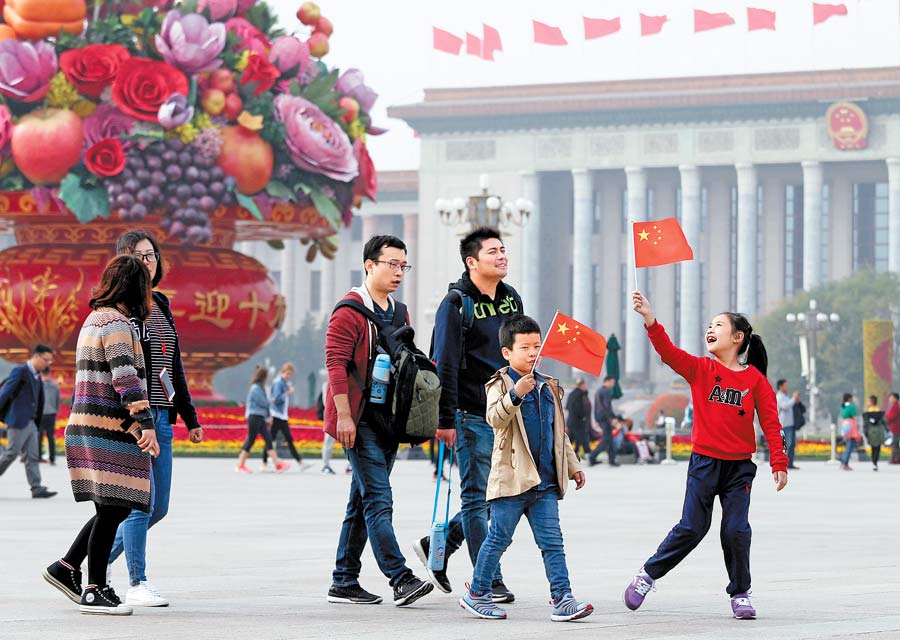Academics expect stronger nation as China enters ‘new era’

A few tourists, with the children waving Chinese national flags, walk past Tian'anmen Square in Beijing during the 19th CPC National Congress, which was held from Oct. 18 to 24.
Scholars expressed optimism that the Thought on Socialism with Chinese Characteristics for a New Era, which General Secretary of the CPC Central Committee Xi Jinping put forward in his report to the recently concluded 19th Party congress, will guide the nation to achieve socialist modernization and national rejuvenation as expected.
It is vital to define the era when planning for China’s future. “With decades of hard work, socialism with Chinese characteristics has crossed the threshold into a new era,” Xi said in his report. “This is a new historic juncture in China’s development.”
Han Zhen, Party secretary of Beijing Foreign Studies University, said that the “new era” is the culmination of constant exploration and experience accumulated over the last four decades, especially in the past five years.
After nearly 40 years of unremitting efforts, particularly since the 18th CPC National Congress, unprecedented changes have taken place within the Party, the country, the people, the army and the Chinese nation. China objectively needs to reevaluate the stage it has reached, Han said.
The new positioning has refreshed the historical coordinates for the new chapter of the great cause of socialism with Chinese characteristics, said Yan Kun, a delegate to the 19th CPC National Congress and Party secretary of the Rural Development Institute at the Chinese Academy of Social Sciences (CASS).
Guo Jianning, a professor of Marxism at Peking University, said that the founding of the People’s Republic of China signified that the country “stood up,” the reform and opening up represented the moment the nation set out on the path to “get rich,” and the new era of socialism with Chinese characteristics signals that it is “becoming stronger.”
Notably, the report redefined the principal contradiction facing Chinese society. It identified as the primary challenge the contradiction between unbalanced, inadequate development and the people’s ever-growing needs for a better life.
Jin Minqing, deputy director of the Academy of Marxism under CASS, noted that the principal contradiction facing Chinese society was formerly considered the gap between the ever-growing material and cultural needs of the people and backward production.
Now the people’s desires have expanded. They not only have higher material and cultural demands, but there is also a growing demand for democracy, rule of law, fairness, justice, security and a clean environment, Jin said.
Meanwhile, as China’s productive forces continue to grow to new heights, unbalanced and inadequate development is becoming a more prominent issue, Jin said. The historic change is the basic foundation and intrinsic basis that defines this new juncture.
Scholars concurred that Thought on Socialism with Chinese Characteristics for a New Era was the highlight of the report to the 19th Party congress.
Yan Xiaofeng, a professor at the PLA National Defense University, said that Xi’s Thought on Socialism with Chinese Characteristics for a New Era clarifies fundamental issues like the overarching goal, general task, overall layout, development direction, model and motivation, strategic steps, external conditions and political guarantee. It comprehensively innovates the theoretical system of socialism with Chinese characteristics and elevates the system to a new height of the era.
Jin said that Xi’s Thought on Socialism with Chinese Characteristics for a New Era is the latest achievement of the Sinicization of Marxism and an important component of the theoretical system of socialism with Chinese characteristics, providing a guide to action for realizing the great rejuvenation of the Chinese nation.
Another highlight of the report is that it further divides the second centenary goal of turning China into a great modern socialist country in every dimension by 2050.
“In the first stage from 2020 to 2035, we will build on the foundation created by the moderately prosperous society with a further 15 years of hard work to see that socialist modernization is basically realized,” according to the report. “In the second stage from 2035 to the middle of the 21st century, we will, building on having basically achieved modernization, work hard for a further 15 years and develop China into a great modern socialist country that is prosperous, strong, democratic, culturally advanced, harmonious, and beautiful.”
“From the ‘Two Centenary Goals’ to the ‘Two 15-Year Objectives,’ the roadmap to the great rejuvenation of the Chinese nation has been made clearer and the timetable more precise,” Yan said.
Jin noted that “beautiful” has been added to describe the great modern socialist country, which reflects the emphasis on green development.
“This fully demonstrates that socialist modernization is all-dimensional and high-level, aiming at the overall development of the people and comprehensive progress of society,” Jin added.
MAO LI, WANG GUANGLU and SU PEI are reporters at the Chinese Social Sciences Today.

 PRINT
PRINT CLOSE
CLOSE